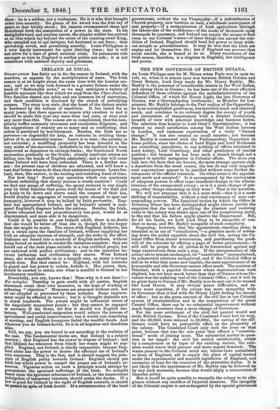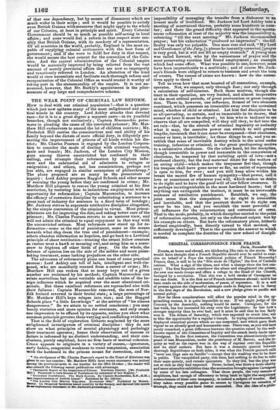THE NEW GOVERNOR OF BRITISH GUIANA.
As Louis Philippe sent for M. Thiers when Paris was in open re- volt, so, when it is almost open war between British Guiana and Great Britain, Lord Grey sends for Mr. Henry Barkly. Mr. Barkly is the possessor of considerable estates in the West Indies, and among them in Guiana ; he has been one of the most effective defenders of those colonies against the maladministration of the Colonial Office, of which Sir Henry Light, the late Governor of Guiana, was a thoroughgoing instrument ; as Member for Leo- minster, Mr. Barkly belongs to the Peel section of the Opposition; he is an accomplished gentleman, has travelled much and observed much, and combines in no ordinary degree the energy of youth and earnestness of temperament with a discreet moderation, breadth of view with practical knowledge and business habits. The selection does honour to Lord Grey's discrimination ; it has created no small satisfaction among the West Indian interest in London, and immense expectation of a truly " blessed change." It has also created no small surprise; not because Mr. Barkly is connected with the Parliamentary Opposition is home politics, since the choice of Lord Elgin and Lord Dalhousie are overriding precedents, to say nothing of offices intrusted to Lord Ashley, Lord Courtenay, and other gentlemen of similar position ; but because he has been such a stanch though not a bigoted or spiteful antagonist in Colonial affairs. The more you look into the facts that are known, the more strange appears such a departure from the usual course, the less do any very magnifi- cent expectations appear to be justified without some further de- velopment of the official intention. On what terms is the appoint- ment made and accepted? Is it accompanied by the conveyance of adequate powers to effect some beneficial change in the admin- istration of the exasperated colony ; or is it a mere change of per- sons, other things remaining as they were ? That is the question. We will not presume that it is a mere trick—that it is a mere shifting of responsibility, without a real conveyance of some cor- responding powers. The Jesuitical tactics by which the Office in Downing Street has been distinguished might almost justify the suspicion that the task of pacifying the planters and restoring order to the colony was thrust upon one of the complaining party, to the end that his failure might absolve the Department. But, for all his faults, we hold Lord Grey to be incapable of con- duct so mean, and Mr. Barkly incapable of such complicity. Supposing, however, that the appointment, standing alone, is intended as an act of " conciliation,' —a gracious mode of soften- ing down the paltry squabble about the civil list, saving the Co- lonial Office from actual retractation, and purchasing the good- will of the colonists by offering a gage of better government,—it will still be proper for all parties to be forewarned against any large expectations from such a step. If the circumstances of the colony are to remain unchanged, its " constitution " un popularized, its commercial relations unimproved, and if the Colonial Office is still to be what that name now implies, the mere appointment of an honourable and able Governor cannot effect much. The position of Trinidad, with a popular Governor whose representations were slighted, has not been much better than that of Guiana whose Go- vernor was the unfailing tool of the Colonial Office ; and it will be no great boon to Guiana if Mr. Barkly is to be sent out to be treated like Lord Harris. It may obviate minor difficulties, and re- move some asperities, if the colony has more sympathy with its Governor than it had with Sir Henry Light during his decade of office ; but as the gross amount of the evil lies in our Colonial system of administration and in the composition of the great Central Office, there can be no substantial improvement without much larger measures than a mere change of Governors. For the mere settlement of the civil list quarrel would not settle British Guiana. Even if the Combined Court had its way, and the 39,0001. were reduced to 26,0001., the saving of the dif- ference could have no perceptible effect on the prosperity of the colony. The Combined Court only took the issue on that point, because that was the sole point that offered a "constitu- tional" mode of joining issue. The substantial matter in ques- tion is far larger : the civil list settled satisfactorily, either by a compromise or by lapse of the existing statute, the colo- nists would renew their greater and more urgent demands. The wants present to the Colonial mind are, labour-laws assimilated to those of England, aid to supply the place of capital wasted under the experimental and mutable legislation of England, and extension of time for the cessation of the protective duties. It is not likely that the appointment of Mr. Barkly can be followed up by any such measures, because that would imply a retractation of Imperial policy. But it mould be quite possible to reconcile the colony to its alle- giance without any sacrifice of Imperial interests. The integrity of the Colonial empire is not endangered by the special grievances Of that one dependency, IntIy-causes of discontent which are much wider in their ac ; and it would be possible to satisfy even British Guiana wit easures that might apply to the whole of our Colonies, at least in principle and spirit. Every Colonial Government should be as much as possible self-acting in local affairs ; and none 'would feel a reform in that respect more sen- sibly that British Guiana, with its mockery of a representation. Of all countries in the world, probably, England is the most ca- pable of supplying colonial settlements with the best form of government ; and if she were to fulfil her duty in that respect, she would secure the best cement for the connexion of the Colo- nies. And the central administration of the Colonial empire would be materially improved by being relieved from the vast amount of merely provincial affairs that are now so improperly and vexatiously referred to London. An alteration of the kind would at once necessitate and facilitate such thorough reform and reorganization of the Colonial Office as would render it worthy of taking part in the statesmanship of the empire. It is not an- nounced, however, that Mr. Barkly's appointment is the pilot- measure of any large and comprehensive scheme.



























 Previous page
Previous page